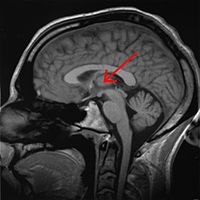
Photo from wikipedia
Alpers' syndrome is a severe neurodegenerative disease typically caused by bi‐allelic variants in the mitochondrial DNA (mtDNA) polymerase gene, POLG, leading to mtDNA depletion. Intractable epilepsy, often with an occipital… Click to show full abstract
Alpers' syndrome is a severe neurodegenerative disease typically caused by bi‐allelic variants in the mitochondrial DNA (mtDNA) polymerase gene, POLG, leading to mtDNA depletion. Intractable epilepsy, often with an occipital focus, and extensive neurodegeneration are prominent features of Alpers' syndrome. Mitochondrial oxidative phosphorylation (OXPHOS) is severely impaired with mtDNA depletion and is likely to be a major contributor to the epilepsy and neurodegeneration in Alpers' syndrome. We hypothesised that parvalbumin‐positive(+) interneurons, a neuronal class critical for inhibitory regulation of physiological cortical rhythms, would be particularly vulnerable in Alpers' syndrome due to the excessive energy demands necessary to sustain their fast‐spiking activity.
Journal Title: Neuropathology and Applied Neurobiology
Year Published: 2022
Link to full text (if available)
Share on Social Media: Sign Up to like & get
recommendations!